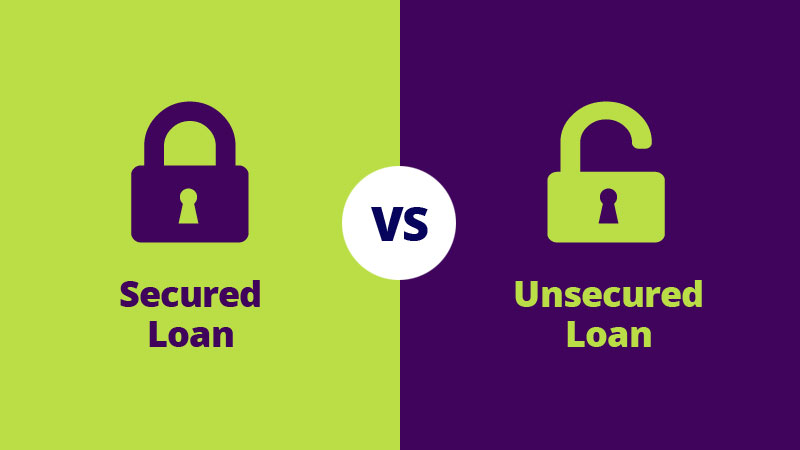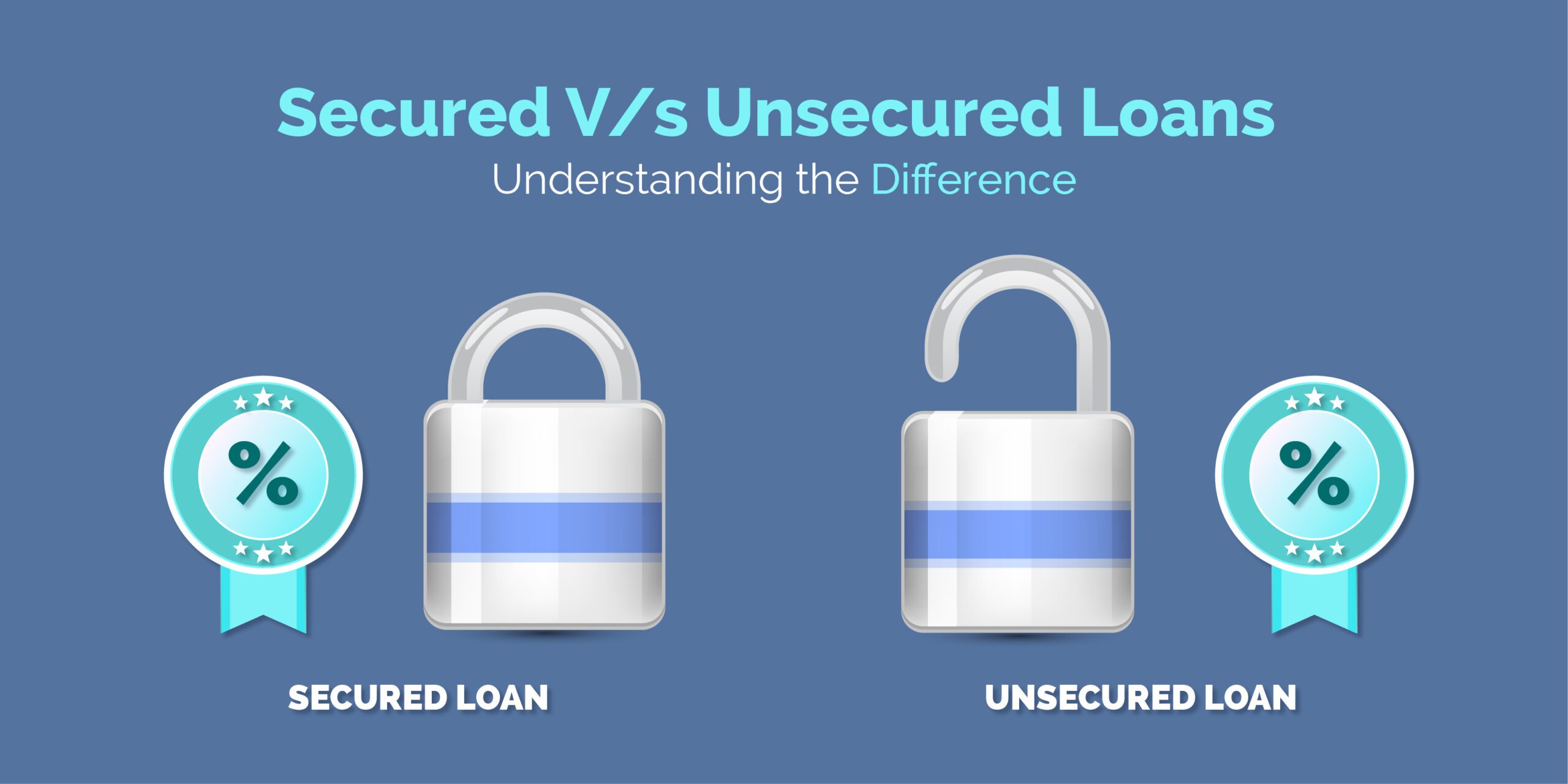Detail Guide on Secured Vs Unsecured Loans
- 1 Secured Loans:
- 2 Benefits of Secured Loans:
- 2.1 Lower Interest Rates:
- 2.2 Access to Larger Loan Amounts:
- 2.3 Improved Approval Rates:
- 2.4 Flexible Repayment Terms:
- 2.5 Opportunity to Build or Rebuild Credit:
- 3 Unsecured Loans
- 4 Advantages of Unsecured Loans:
- 4.1 No Collateral Required:
- 4.2 Quick Approval and Processing:
- 4.3 Versatility in Use:
- 4.4 Accessible to a Broad Audience:
- 4.5 No Risk of Asset Seizure:
- 5 Secured Loans Vs Unsecured Loans
- 5.1 Secured Loans: A Foundation of Stability
- 5.1.1 Collateral Requirement:
- 5.1.2 Risk and Interest Rates:
- 5.1.3 Loan Amounts:
- 5.1.4 Approval Criteria:
- 5.1.5 Asset Seizure:
- 5.2 Unsecured Loans: Flexibility without Collateral
- 5.2.1 Collateral Requirement:
- 5.2.2 Risk and Interest Rates:
- 5.2.3 Loan Amounts:
- 5.2.4 Approval Criteria:
- 5.2.5 Asset Seizure:
- 6 Choosing the Right Fit for You:
- 7 Conclusion:
In the realm of financial planning, securing the right type of loan is often a critical decision that individuals and businesses must make. One prevalent option is the secured loan, a financial instrument that comes with distinct advantages. In this article, we delve into the concept of secured loans and highlight the benefits that make them a favorable choice for many borrowers.
Secured Loans:
Secured loans are a type of borrowing that requires the borrower to pledge collateral as security for the loan. This collateral, typically an asset with tangible value such as real estate, vehicles, or valuable possessions, serves as a guarantee for the lender. In the event of default on the loan, the lender has the legal right to seize and sell the collateral to recover the outstanding amount.
Benefits of Secured Loans:
Lower Interest Rates:
One of the primary advantages of secured loans is the potential for lower interest rates compared to unsecured personal loans. Lenders perceive secured loans as less risky because they have the security of collateral. This reduced risk often translates into more favorable interest rates for borrowers, making secured loans a cost-effective borrowing option.
Access to Larger Loan Amounts:
The presence of collateral allows borrowers to access larger loan amounts than what might be available with unsecured personal loans. Lenders are more willing to extend substantial credit when there is an asset of value securing the loan. This can be particularly beneficial for major expenses such as home renovations, business investments, or large-scale purchases.
Improved Approval Rates:
Secured loans may be more accessible to individuals with lower credit scores or those with a limited credit history. The collateral provides a level of assurance for the lender, making them more inclined to approve loans for individuals who might face challenges in securing unsecured financing.
Flexible Repayment Terms:
Secured loans often offer more flexible repayment terms, allowing borrowers to tailor the loan structure to their financial situation. This flexibility can include extended repayment periods, making it easier for borrowers to manage their monthly payments and align them with their cash flow.
Opportunity to Build or Rebuild Credit:
For individuals looking to establish or rebuild their credit history, a secured loan can be a strategic tool. Timely repayments on a secured loan contribute positively to credit scores, demonstrating responsible financial behavior. This, in turn, can improve the borrower’s creditworthiness over time.
Unsecured Loans
Unsecured loans are a category of loans that do not necessitate the pledging of collateral. Instead, these loans are approved based on the borrower’s creditworthiness, including factors such as credit history, income stability, and employment status. Without the safety net of collateral, lenders rely heavily on the borrower’s financial profile to assess the risk involved.
Advantages of Unsecured Loans:
No Collateral Required:
The most apparent benefit of unsecured loans is the absence of collateral. Borrowers are not required to put their assets, such as homes or vehicles, on the line to secure the loan. This is particularly advantageous for individuals who may not possess valuable assets or those who are hesitant to risk their possessions.
Quick Approval and Processing:
Unsecured loans often have a quicker approval process compared to secured loans. The absence of collateral evaluation streamlines the application and approval process, making unsecured loans an excellent choice for those in need of swift access to funds for time-sensitive expenses.
Versatility in Use:
Borrowers have the flexibility to use unsecured loans for a variety of purposes. Whether it’s consolidating high-interest debt, covering medical expenses, or funding a small business venture, the versatility of unsecured loans makes them adaptable to a wide range of financial needs.
Accessible to a Broad Audience:
Unsecured loans may be more accessible to individuals with good credit scores. This accessibility expands the pool of potential borrowers, allowing those with a strong credit history to secure financing without the need for collateral.
No Risk of Asset Seizure:
Since there is no collateral involved, borrowers do not risk losing their assets in the event of default. While this lack of collateral may result in higher interest rates, it provides peace of mind for individuals who prioritize protecting their valuable possessions.
Secured Loans Vs Unsecured Loans
When it comes to navigating the landscape of borrowing, understanding the differences between secured and unsecured loans is crucial. Each type of loan comes with its unique features and considerations, catering to diverse financial needs. In this article, we’ll explore the distinctions between secured and unsecured loans, helping borrowers make informed decisions based on their circumstances.
Secured Loans: A Foundation of Stability
Secured loans, as the name suggests, are anchored by collateral, tangible assets that borrowers pledge to lenders as security. This collateral mitigates the lender’s risk and provides a foundation of stability for both parties involved.
Collateral Requirement:
Secured Loans: Require collateral, often in the form of real estate, vehicles, or other valuable assets.
Risk and Interest Rates:
Secured Loans: Considered lower risk for lenders, resulting in lower interest rates for borrowers.
Loan Amounts:
Secured Loans: Often allow access to larger loan amounts due to the presence of collateral.
Approval Criteria:
Secured Loans: May be accessible to individuals with lower credit scores since collateral provides security.
Asset Seizure:
Secured Loans: Lenders can seize and sell the collateral in the event of default to recover the outstanding amount.
Unsecured Loans: Flexibility without Collateral
Unsecured loans, in contrast, do not require collateral and are approved based on the borrower’s creditworthiness. While these loans offer flexibility, they come with their own set of considerations.
Collateral Requirement:
Unsecured Loans: Do not require collateral, relying on the borrower’s creditworthiness.
Risk and Interest Rates:
Unsecured Loans: Considered higher risk, resulting in higher interest rates for borrowers.
Loan Amounts:
Unsecured Loans: May offer smaller loan amounts compared to secured loans.
Approval Criteria:
Unsecured Loans: Often require a higher credit score and a stable financial profile for approval.
Asset Seizure:
Unsecured Loans: Lenders do not have specific collateral to seize in the event of default.
Choosing the Right Fit for You:
Financial Goals:
Secured Loans: Ideal for larger expenses such as home purchases or business investments.
Unsecured Loans: Suited for various purposes, including debt consolidation, medical expenses, or smaller-scale ventures.
Risk Tolerance:
Secured Loans: Lower risk for lenders and may be more forgiving for individuals with lower credit scores.
Unsecured Loans: Higher risk, requiring a strong credit history for favorable terms.
Collateral Considerations:
Secured Loans: Require valuable assets as collateral, posing a risk to those unwilling to pledge personal property.
Unsecured Loans: Appeal to individuals who prefer not to risk their assets for a loan.
Conclusion:
Choosing between secured and unsecured loans involves careful consideration of individual financial goals, risk tolerance, and creditworthiness. While secured loans offer stability and lower interest rates, unsecured loans provide flexibility and accessibility. Understanding these differences empowers borrowers to select the financing option that aligns best with their unique circumstances, ultimately paving the way to financial success.




















